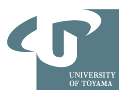International Exchange
When students from the School of Economics study abroad at overseas universities that have exchange agreements with the University of Toyama, the candidate destinations for studying abroad are universities with either departmental exchange agreements or university-wide exchange agreements.
One advantage of studying at these partner universities is that students generally do not have to pay admission fees or tuition fees at the host university (except for some universities).
Additionally, credits earned at the host university are recognized as credits earned at the University of Toyama, and the study abroad period is included in the student's enrollment period at the School of Economics.
Study Abroad Destinations
Based on past records and other factors, the following universities are considered the main candidates for study abroad destinations.
Since there are limits on the number of accepted students, please check with the School of Economics Academic Affairs Office for detailed information.
Faculty Exchange Relationship
- Southwest Jiaotong University, School of Transportation and Logistics (China)
- Central South University of Forestry and Technology, School of Economics and Management (China)
- Inner Mongolia University, School of Economics and Management (China)
- Kyonggi University, College of Business Administration and College of Humanities and Social Sciences (South Korea)
University Exchange Relationships
(Partial list of universities where students from the School of Economics can study abroad)
- Murray State University (USA)
- University of Orléans (France)
- Kangwon National University (South Korea)
- Kookmin University (South Korea)
- Shanghai University (China)
- Liaoning University (China)
- Shandong University (China)
- Lanzhou University (China)
- Northeastern University (China)
- Dalian University of Technology (China)
- Kainan University (Taiwan)
- National Chengchi University (Taiwan)
- Ming Chuan University (Taiwan)
- AGH University of Science and Technology (Poland)
- Technical University of Košice (Slovakia)
- University of Žilina (Slovakia)
- Universiti Tunku Abdul Rahman (Malaysia)
the Study Abroad Information Session
A study abroad information session is held around November, so please pay attention to the notices posted by the School of Economics Academic Affairs Office.
Also, questions and consultations regarding study abroad are accepted at any time at the School of Economics Academic Affairs Office.
Study Abroad Applications
For faculty exchange partner universities, the School of Economics Academic Affairs Office handles the application process.
If you wish to start studying abroad in the fall semester (August or September), please submit your application by April 15 (however, you should notify the office by mid-February).
If you wish to start studying abroad in the spring semester (April), please submit your application by December 15 (however, you should notify the office by mid-November).
Applications for study abroad scholarships are also accepted at the same time; since some scholarship deadlines are early, please check the study abroad bulletin board. Additionally, applications may be accepted outside of these periods in some cases, so please consult the School of Economics Academic Affairs Office.
For University exchange partner universities, the International Affairs Division handles the applications.
If you plan to start studying abroad between January and March, please submit your application by July.
If you plan to start studying abroad between August and October, please submit your application by January.
Study Abroad Reports
These are reports written by students who have studied at partner universities under exchange agreements.
Tutor System
The School of Economics recruits tutors to support international students enrolled at the university.
A tutor is someone who assists international students who are unfamiliar with life in Japan. A stipend will be provided based on the level of support, within the limits of the available budget.
Duties
- Providing advice on general aspects of student life
- Offering academic advice and supplementary instruction
- Assisting with the improvement of Japanese language skills
- Helping international students understand Japanese customs, traditions, culture, and history
Eligibility
- Undergraduate students: 2nd, 3rd, and 4th year
- Graduate students: 2nd year
